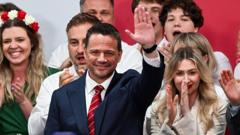The upcoming presidential election in South Korea, set for June 3rd, could lead to a significant overhaul in the nation’s diplomatic approach towards North Korea and China. If the leading candidate, Lee Jae-myung, wins, a shift towards diplomacy may replace the confrontational stance adopted under former President Yoon Suk Yeol, who was ousted in April due to martial law actions.
South Korea's Presidential Election: A Shift in Foreign Policy Towards China and North Korea

South Korea's Presidential Election: A Shift in Foreign Policy Towards China and North Korea
As South Korea prepares for its presidential election, candidates indicate a potential pivot in relations with North Korea and China, contrasting sharply with prior administration policies.
During Yoon’s term, relations with North Korea and China deteriorated markedly. The administration's aggressive posture towards North Korea dismissed dialogue, with Yoon's government promoting external influences into this closed-off state. Consequently, North Korea shifted its stance, previously advocating for reunification, and now viewing South Korea as a rival worthy of aggression, including nuclear threats.
Furthermore, Yoon upset a historical equilibrium South Korea maintained between its military ally, the United States, and its largest trade partner, China. His administration's alignment with the U.S. amid tensions between Washington and Beijing aggravated bilateral relations, with accusations of espionage and election manipulation aimed at China.
Lee Jae-myung, considered the frontrunner according to polling, has voiced his intention to mend the strain in relations with China and recalibrate foreign policy tactics. His contrasting approach seeks to foster dialogue and reconciliation with both neighbors, distancing himself from Yoon's aggressive style.
Despite differences in their foreign policy outlooks, Lee's primary rival, Kim Moon-soo, shares common ground in supporting the U.S. alliance while advocating for improved ties with its regional neighbors.
As South Korea stands at this potential crossroads, voters will weigh the implications of their choice not just on domestic affairs but also on the country’s international relations, particularly with North Korea and China.
Furthermore, Yoon upset a historical equilibrium South Korea maintained between its military ally, the United States, and its largest trade partner, China. His administration's alignment with the U.S. amid tensions between Washington and Beijing aggravated bilateral relations, with accusations of espionage and election manipulation aimed at China.
Lee Jae-myung, considered the frontrunner according to polling, has voiced his intention to mend the strain in relations with China and recalibrate foreign policy tactics. His contrasting approach seeks to foster dialogue and reconciliation with both neighbors, distancing himself from Yoon's aggressive style.
Despite differences in their foreign policy outlooks, Lee's primary rival, Kim Moon-soo, shares common ground in supporting the U.S. alliance while advocating for improved ties with its regional neighbors.
As South Korea stands at this potential crossroads, voters will weigh the implications of their choice not just on domestic affairs but also on the country’s international relations, particularly with North Korea and China.





















